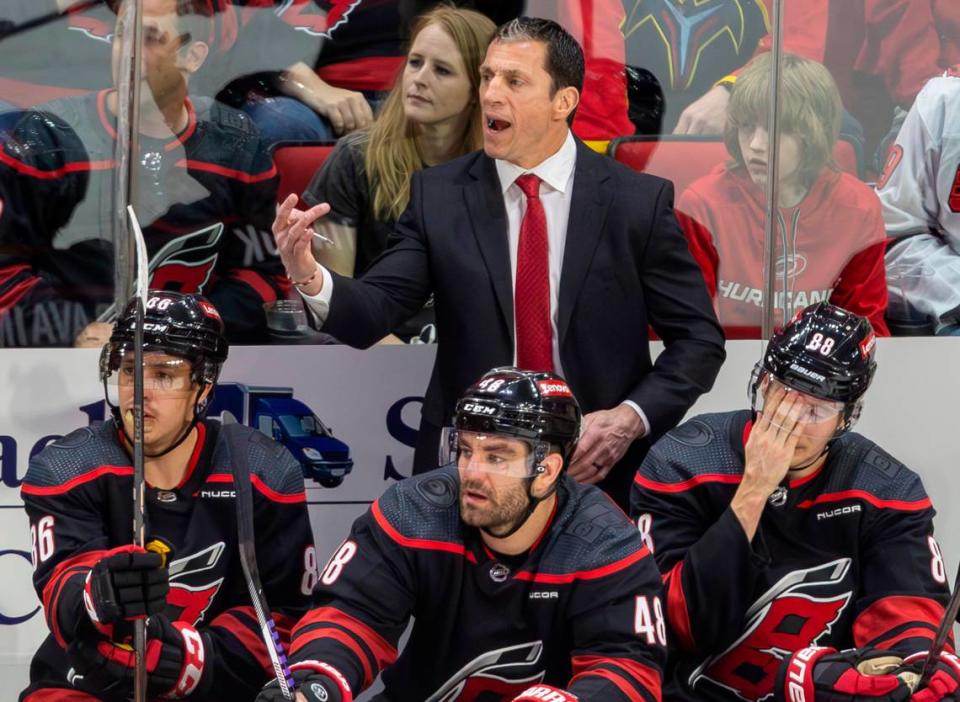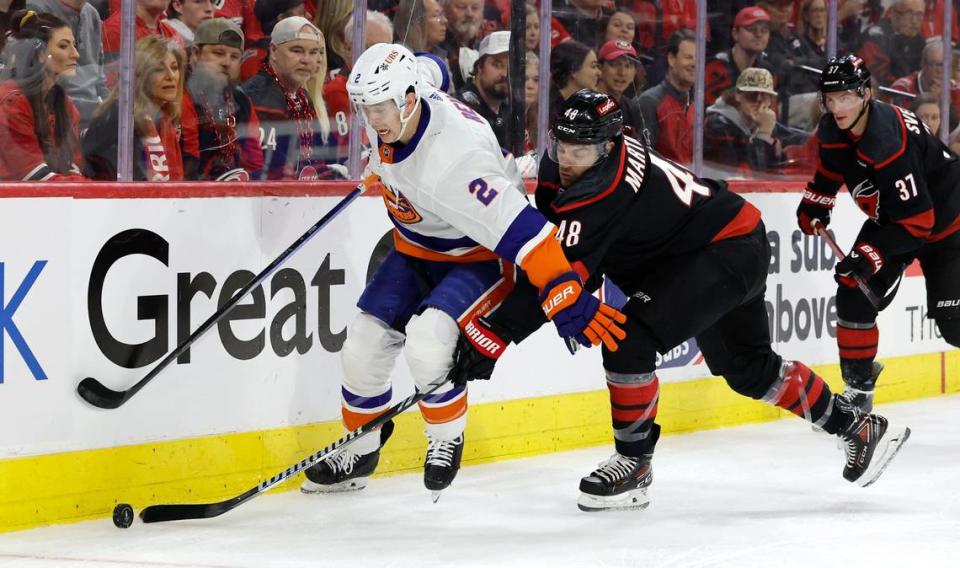Hurricanes’ inevitable personnel changes an opportunity to reassess style, philosophy
The heart of the roster won’t change. Sebastian Aho. Jaccob Slavin. Andrei Svechnikov. Jordan Staal. Brent Burns. Those key players will still be at the core of the Carolina Hurricanes next season, whatever pieces may change around them.
Many others will.
And it’s time.
Being eliminated by the New York Rangers in the second round for the second time in three years is a blaring siren for change, and not just on the roster, which is inevitable. In the wake of Thursday’s loss, everyone knew it.
“That sucks. Special group,” Aho said afterward. “Hopefully, we’ll stay the same as possible, but that’s the (expletive) part of this. We had, like I said, a special group. I thought we had everything we need to get over the hump. Yeah. It sucks.”
As difficult as it may be, all this turnover is an opportunity to retool and reflect, because as the roster changes, the Hurricanes also have to take a long look not only at personnel, but at their style and philosophy, because what has brought them so much success in the regular season and against inferior teams in the playoffs continually failed this group when it really mattered.
With at least nine and probably closer to a dozen of the players on the roster likely headed elsewhere next season, this summer was always going to be a moment of reflection as the page turns on a group that won a playoff round in six straight years but never won a game past the second round.
That starts with Rod Brind’Amour, still unsigned for next year. If his contract impasse becoming a matter of public record didn’t spur the two sides to get it done and put it to bed as a potential distraction, then clearly there’s a genuine fracture here. Coaching certainly wasn’t the problem with this group, but that’s not always the way it works in the NHL.
And as much as it’s borderline madness to let the person most responsible for ending a decade in the wilderness walk — and unlike a broadcaster or two, the head coach is certainly not an easily replaceable part — the lack of postseason advancement is a valid reason to go another direction if that’s what owner Tom Dundon really wants.

The blue line, so long a rock for this team, will need at least some rebuilding. While there still may be a chance to bring Brett Pesce back, and Tony DeAngelo if the Hurricanes so desire, Brady Skjei and Jalen Chatfield are likely headed for paydays elsewhere. Is Scott Morrow ready? Time will tell, and top prospect Alexander Nikishin is still a year away.
That will happen more around the edges up front. It’s hard to see any reason to pay what it would take to keep Jake Guentzel, and restricted free agent Martin Necas is a candidate to trade as much as re-sign — even as Game 6 was arguably the best playoff performance of his entire career — and Teuvo Teravainen and Jordan Martinook are both unrestricted free agents.

Then there’s Jesperi Kotkaniemi, who the Hurricanes essentially chose over Vincent Trocheck two years ago. Kotkaniemi is a good teammate whose effort is never in doubt, but at this point he’s only marginally better than any of the bottom-six centers the Hurricanes have sloughed off in trades over the past few years — Eetu Luostarinen, Nicolas Roy, Vasily Ponamarev — except Kotkaniemi is the Hurricanes’ fourth highest-paid forward and was nearly shut out in the postseason.
His contract is inevitable spillover from the Hurricanes’ bold move to poach him from the Montreal Canadiens, and no second-guessing there, but Kotkaniemi hasn’t turned out to be the player they thought he was at any price, and there are still three years to run on his deal. At what point do the Hurricanes admit it didn’t work out as planned and find a way to free up that cap space for a better player?
Stefan Noesen’s obviously a fit, but if that was an easy one, he’d already be re-signed. And what do you do with restricted free agent Jack Drury, with a difficult negotiation looming? Meanwhile, Brendan Lemieux, who was not preferred to Evgeny Kuznetsov or even Maxime Comtois in the playoffs, is re-signed for next year.
Still, even in the best of times, turnover is inevitable, and on that note, let us not proceed without a tip of the cap to the departing Antti Raanta, one of the best humans ever to put on the jersey. And speaking of goalies, after Frederik Andersen’s shaky playoff performance, next year should be the official changing of the guard to Pyotr Kochetkov.
And with all that, the competitive cycle for this particular group comes to an ignominious end.
“You never know what opportunity you have to win, and I thought we had one,” Andersen said. “You never know when you’re going to get the next one. It hurts a lot to not take advantage of it.”
But as these personnel decisions, and perhaps even coaching decisions, are made, the Hurricanes need to ask and answer two much bigger questions.
Is their roster-building philosophy, prioritizing skill and the ability to generate shots above all the other considerations other teams indulge, actually conducive to postseason success?
And does the shoot-first-ask-questions-later style that philosophy facilitates, and the Hurricanes embrace, even work against better goalies and well-coached, motivated opponents deeper in the playoffs?
Because while the consistency in winning a playoff round should not be taken for granted, especially given the decade that preceded it, there’s also a mounting pile of evidence — an 0-8 record in the conference finals and two shut-downs by Igor Shesterkin in years the Hurricanes should have gone farther — the answer to both questions is no.
(There was an acknowledgment of some of that when the Hurricanes signed Michael Bunting and Lemieux in the summer, two potential postseason pests, but Bunting never really fit before he departed in the Guentzel trade and Lemieux never claimed a regular roster spot.)
The why behind it is a combination of all three interlocking factors, philosophy, style and personnel — and when you keep losing playoff series the same way, clearly something is not working in at least one and probably all three departments.
These Hurricanes are inadvertently built to beat up on bad teams. That gets you into the playoffs (no small feat!) and can win a round or two (laudably!) but there comes a point where there are only good teams (and great goalies!) left.
As the roster changes, this next iteration of the Hurricanes has to differ in other ways as well, or history is doomed to keep repeating itself.
Never miss a Luke DeCock column. Sign up at tinyurl.com/lukeslatest to have them delivered directly to your email inbox as soon as they post.
Luke DeCock’s Latest: Never miss a column on the Canes, ACC or other Triangle sports

 Yahoo Sports
Yahoo Sports 
